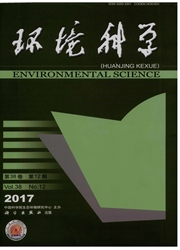

 中文摘要:
中文摘要:
随着水资源供需矛盾日益尖锐,污水再生利用成为了缓解北京水资源紧缺的重要举措.为推动北京再生水安全灌溉,本研究运用ENVIRO-GRO模型模拟缺水城市北京再生水灌溉土壤水盐运动规律,并对土壤盐分累积进行预测,探讨了不同灌溉措施对土壤水盐运动规律和盐分累积的影响.结果表明,高水量、常规、低水量灌溉,平衡时土壤含盐量(ECe)年均值分别增加了29.5%、97.2%、197.8%;灌溉频率对土壤水盐运动规律影响不大,但低频灌溉下土壤中盐分的累积有减少的趋势;灌溉水含盐量(ECw)为0.6、1.2、2.4 dS.m-1灌溉条件下,平衡时ECe的年均值分别增加了23.7%、97.2%、208.5%,自来水灌溉下土壤盐分虽有增加,但土壤未出现盐渍化.总的来说,目前北京常规再生水灌溉,平衡时土壤盐分累积不会影响早熟禾的生长,但土壤会出现轻度盐渍化.
 英文摘要:
英文摘要:
As the conflict between water supply and demand,wastewater reuse has become an important measure,which can relieve the water shortage in Beijing.In order to promote safe irrigation with reclaimed water and prevent soil salinisation,the dynamic transport of salts in urban soils of Beijing,a city of water shortage,under irrigation of reclaimed water was simulated by ENVIRO-GRO model in this research.The accumulation trends of soil salinity were predicted.Simultaneously,it investigated the effects of different irrigation practices on soil water-salt movement and salt accumulation.Results indicated that annual averages of soil salinity(ECe) increased 29.5%,97.2%,197.8% respectively,with the higher irrigation,normal irrigation,and low irrigation under equilibrium conditions.Irrigation frequency had little effect on soil salt-water movement,and soil salt accumulation was in a downward trend with low frequency of irrigation.Under equilibrium conditions,annual averages of ECe increased 23.7%,97.2%,208.5% respectively,with irrigation water salinity(ECw) 0.6,1.2,2.4 dS·m-1.Soil salinity increased slightly with ECw=0.6 dS·m-1,while soil salinization did not appear.Totally,the growth of Blue grass was not influenced by soil salinity under equilibrium conditions with the regular irrigation in Beijing,but mild soil salinization appeared.
 同期刊论文项目
同期刊论文项目
 同项目期刊论文
同项目期刊论文
 Polycyclic aromatic hydrocarbons in soils along the coastal and estuarine areas of the northern Boha
Polycyclic aromatic hydrocarbons in soils along the coastal and estuarine areas of the northern Boha Mass balance-based regression modeling of PAHs accumulation in urban soils, role of urban developmen
Mass balance-based regression modeling of PAHs accumulation in urban soils, role of urban developmen Quantitative assessment on soil enzyme activities of heavy metal contaminated soils with various soi
Quantitative assessment on soil enzyme activities of heavy metal contaminated soils with various soi 期刊信息
期刊信息
